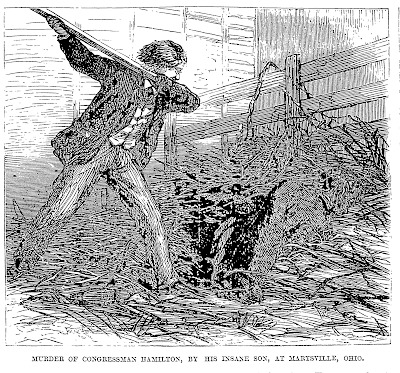18-year-old Thomas Hamilton had been experiencing some mental problems—“mild insanity,” the newspapers said, “such as would only be readily detected by medical men.” But recently, Thomas had been exceedingly melancholy, prompting his teacher to take Thomas to Columbus to be examined by his uncle, Dr. J.W. Hamilton. After meeting with his nephew, Dr. Hamilton advised his brother and the teacher to watch Thomas closely. The diagnosis prompted the Congressman’s return.
.jpg) |
| Cornelius S. Hamilton |
On Sunday morning, Cornelius wrote a letter to General Brinkerhoff of the Ohio Congressional Delegation, explaining why he was absent, including this extract:
As I have above named the cause of my being at home, it is proper that I should be a little more explicit. My wife wrote me that my eldest boy Tom, 18 years old, was threatened with insanity. I found, on my arrival, that her fears had a real foundation, but I hoped that it would be but a temporary trouble, until yesterday, when his conduct was such that I despaired of managing the case at home or at a private water-cure, and I have made arrangements to take him the asylum at Columbus. He has been one of the most quiet, industrious and exemplary boys I ever knew, and the chief reliance for the management of my affairs, and the control of other children, in my absence.
Later that morning, Cornelius went to feed the horses with Thomas and another son, 15-year-old John. They worked for a while, then Cornelius told John to go and get ready for Sunday school. Cornelius stooped down to pick up some feed, and Thomas hit him in the back of the head with a two-inch thick fence post, fracturing his skull and killing him instantly. He covered the body with fodder.
Thomas picked up an axe and went back to the house. He swung the axe at his mother, but John stepped in to shield her receiving a severe wound in his shoulder. The mother and a third son, William, ran from the house and alerted the neighbors.
It took two neighbors to disarm Thomas. Finally, he was subdued and taken to jail for everyone’s safety. John’s wound was treated, and the neighbors found Cornelius’s body in the stable. Thomas refused to say anything on Sunday, but the following morning he confessed to striking his father twice with a piece of wood. He did not seem to have the slightest comprehension of the enormity of the act.
Sources:
“Horrible Murder of a Congressman,” Evening Telegraph, December 23, 1867.
“Melancholy Affair,” Chicago Daily Tribune, December 24, 1867.
“The Murder Of Congressman Hamilton,” Cincinnati Daily Gazette, December 25, 1867.
“Murder of Congressman Hamilton by his Insane Son, at Marysville, Ohio,” Frank Leslie's Illustrated Newspaper, January 18, 1868.
“The Murdered Congressman,” Janesville Daily Gazette, January 3, 1868.
Ohio's 8th congressional district


No comments:
Post a Comment